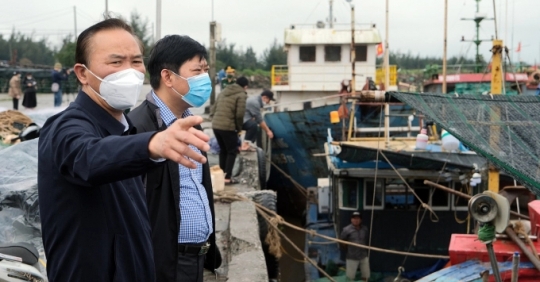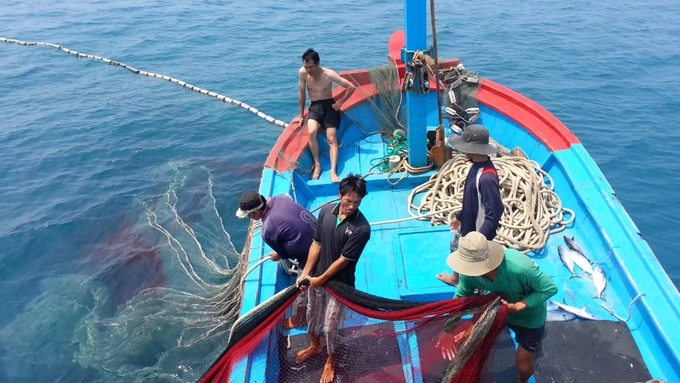
Vietnam has made positive changes in combating IUU fishing.
There is a time when the red card is coming
According to Deputy Minister of Agriculture and Rural Development Phung Duc Tien, in the past period, with major efforts by municipalities, ministries and sectors led by the Secretariat, the Government and the Prime Minister, more than three times during the inspection of the European Commission (EC) confirmed that Vietnam has made positive changes in tackling illegal, unreported and unregulated (IUU) fishing, such as:
However, the deficiencies are still relatively large and have not met the requirements to be able to remove the IUU yellow card, even if there is a risk of a red card at some point. Accordingly, four key issues that the EK mentioned during the inspection process are the legal framework, fleet management and monitoring, and traceability.
Deputy Minister Phung Duc Tien said first of all about the legal framework, Vietnam has received the 2017 Fisheries Law, effective from 2019, and a series of decrees, circulars … all with consultation from the European side and in response to such a system of legal documents has emerged Vietnam qualified for prosecution, aiming to remove yellow card.
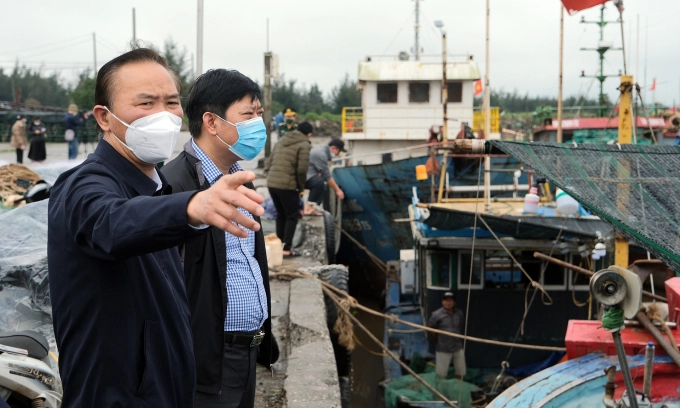
Deputy Minister of Agriculture and Rural Development Phung Duc Tien and Deputy Director-General of the General Department of Fisheries Nguyen Quang Hung inspect Cua Lan Fishing Port, Tien Hai District, Thai Binh, March 2022. Picture: Bao Thang.
“Second, fleet management and monitoring is a huge problem that needs to be solved. Although we have installed 95% of the cruise surveillance equipment, the remaining ships are subject to high risk of violations, there are still cases of ships violating foreign waters. From the beginning of 2023 to now, we had 6 fishing vessels breaching foreign waters, including 3 vessels from Binh Dinh, 1 vessel from Khanh Hoa, 2 vessels from Binh Thuan,” the Deputy Minister said.
The head of the Ministry of Agriculture and Rural Development also said that when many provinces are notified of the violation of local fishing boats, they only keep records and do not take any administrative action under Decree No. 42/2019/ND-CP of the Government Regarding the In addition to provisions sanctioning administrative violations in the fisheries sector, enforcement of the law has not been consistent, effective or ineffective.
“EC inspectors have reiterated many times, if the fleet cannot be managed, there are still ships violating foreign waters, Vietnam will not be able to remove the IUU yellow card. So this is the key issue we need to solve,” stressed Deputy Minister Phung Duc Tien.
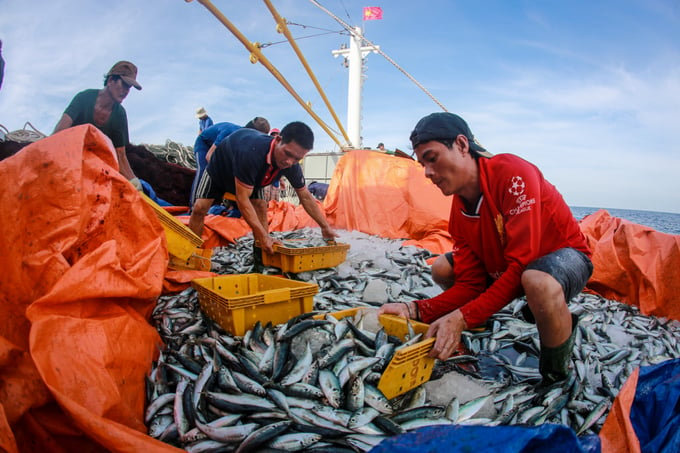
Investments in fisheries infrastructure are very weak and limited. Picture: tsp.
Third, the Ministry of Agriculture and Rural Development has entrusted the Ministry of Animal Health and the Ministry of Fisheries Control with inspection and verification related to the traceability of seafood, management of imported products and products caught at sea.
“Besides the 4 problems specified by the EC, it can be seen that the investments in fisheries infrastructure are also very weak, ships do not have enough space at the quay, are forced to enter the quay, resulting in the functional Forces are unable to handle the fishery treatable. In addition, interest from local party committees and investment from the central to the local level are still limited. Therefore, fleet management, traceability and law enforcement are not guaranteed according to the requirements of the EC inspectors,” analyzed the Deputy Minister.
“The IUU Yellow Card warning is having a major impact on the lives of fishermen and the fishing industry in Vietnam. It used to take only 1-3 days to export to Europe, now it takes 2-3 weeks, which increases the cost and affects the products. Not only that, not being able to remove the yellow card also affects Vietnam’s position as a reliable and responsible partner on the international stage,” said Deputy Minister Phung Duc Tien.
Investigate and deal with 100% of fishing vessel cases seized by foreign states
On February 13, 2023, the government issued Decision No. 81/QD-TTg on the publication of the action plan against IUU fishing and prepared to cooperate with the 4th EC inspection delegation.
Accordingly, in terms of the legal framework, mechanisms and policies, the decision establishes the objective of reviewing, amending and supplementing legal documents in accordance with the Commission’s recommendations and ensuring that they are appropriate to the actual situation, and a simplified procedure.
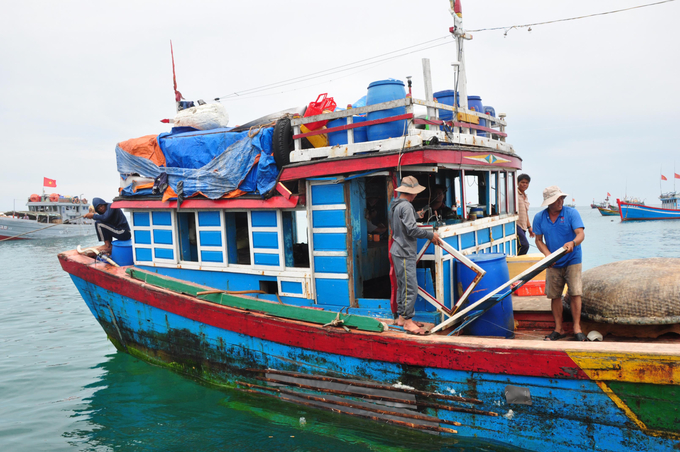
It is necessary to inspect and control 100% of fishing vessels entering and exiting sea border posts and stations. Picture: tsp.
Regarding the management of the fleet and the supervision, inspection and control of the activities of fishing vessels, the decision established the task of checking and statistically recording the total number of local fishing vessels, completing 100% registration and registration, marking fishing vessels, fishing licenses to issue and install fishing vessel surveillance equipment (VMS) according to the regulations.
Update 100% of fishing vessel data in the National Fisheries Database (VNFishbase). Establish a list of non-fishing vessels and vessels at high risk of IUU fishing violations and submit to relevant authorities and assign specific units and individuals for monitoring and management.
100% inspection and control of fishing vessels entering and exiting maritime border posts/stations; Inspection and control of fishing boats entering and leaving the fishing port according to the regulations to ensure that the VMS equipment is running 24/7 from leaving port to the fishing vessel entering port; 24/7 surveillance and surveillance of 100% of fishing vessels operating at sea through a fishing vessel surveillance system.
Development of inter-local coordination rules to control 100% of the province’s fishing vessels operating in areas outside the province, other province’s fishing vessels docked for certification but certified in another province. Develop mechanisms and policies to support fishing vessel owners in the purchase and installation of VMS equipment and satellite subscription fees to keep the VMS equipment operational.
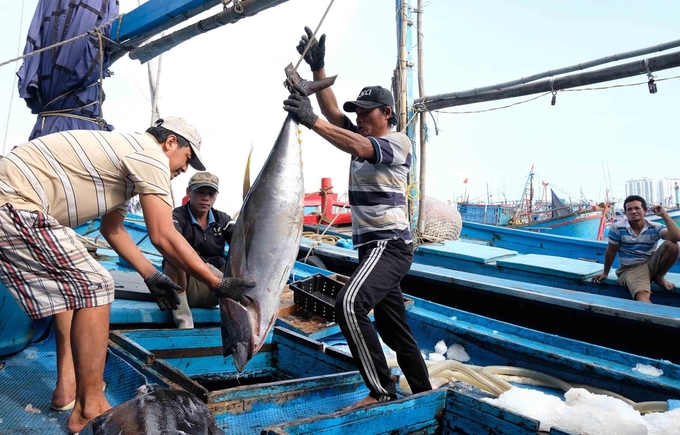
It must be ensured that 100% of the records of shipments exported to the European (EU) and other markets meet traceability requirements for processed fish material. Picture: tsp.
Regarding the certification, certification and traceability of caught seafood, it is required to carry out the certification, certification and traceability of caught seafood according to the guidelines of the Ministry of Agriculture and Rural Development to ensure 100% records of batches entering the EU market (EU) and other markets with traceability requirements for processed fish material.
Ensure that 100% of fishing vessels with the largest length of 15 meters or more must dock in the designated port; The captain must report 1 hour after arrival at the port and keep and present the fishing logbook according to the regulations. Check and compare the information in the fishing logbook to ensure it is consistent with the monitoring data from the fishing vessels.
In terms of prosecuting and dealing with violations, the resolution calls for the cessation of fishing vessels that fish illegally in foreign waters. Investigate and deal with 100% cases of Vietnamese fishing vessels detained by foreign states, and process and sanction 100% cases of illegal fishing in foreign waters and vessel information.
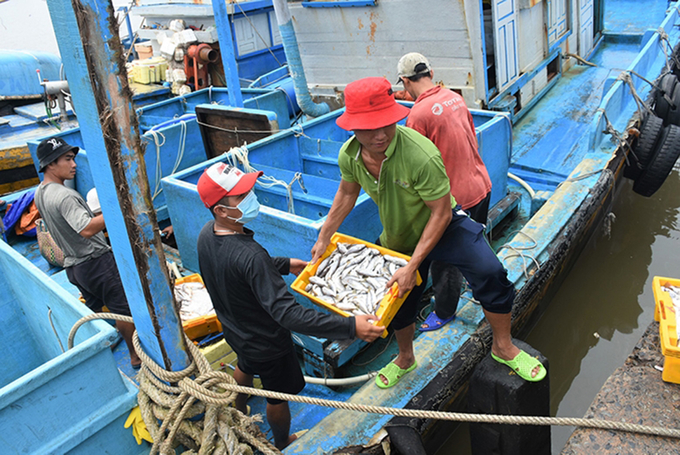
Venues must verify, certify and trace the origin of any seafood caught, in accordance with Department of Agriculture and Rural Development guidelines. Picture: tsp.
Investigate, consolidate records, track and prosecute cases of mediation and connection of Vietnamese fishing vessels and fishermen to illegal seafood exploitation in foreign waters to prevent and manage public service propaganda and deterrence.
Mr Nguyen Quang Hung, deputy director of the General Department of Fisheries and director of the Department of Fisheries Control (Ministry of Agriculture and Rural Development), said that according to the regulations, fishing boats under 15 meters can only fish in coastal areas and inland areas are not exploited in the open sea become.
“A ship under 15 meters that declares otherwise on the high seas is against the law. Today’s most important measure to solve this problem is that 100% of the fishing vessels entering and leaving the quay must be controlled. Border guards need to coordinate with emergency services to regularly inspect and patrol estuaries and sea mouths to promptly prevent fishing vessels under 15 meters from fishing in open waters and harming foreign waters,” Mr Nguyen shared with Quang Hung.

